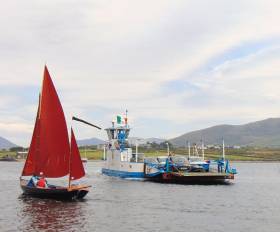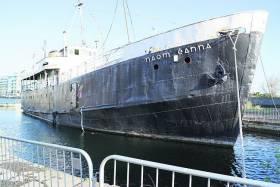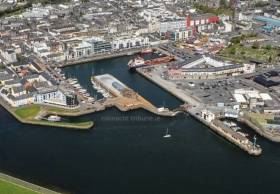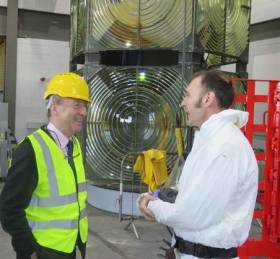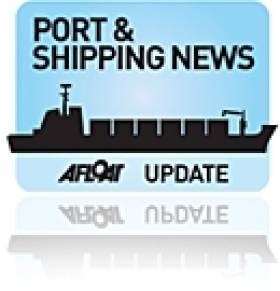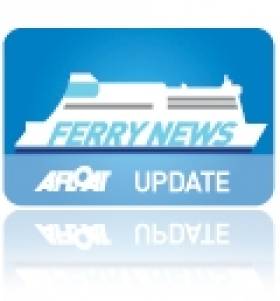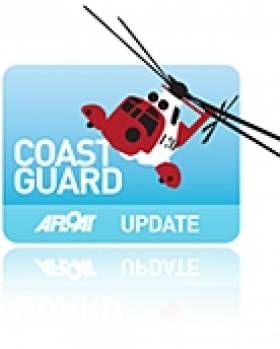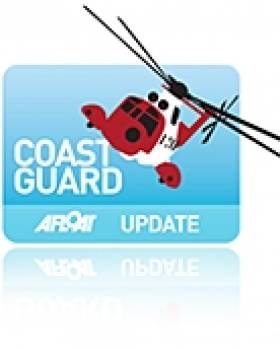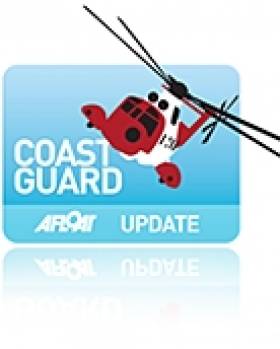Displaying items by tag: Minister for Transport
#NewFerry - The future of the Valentia Island ferry in Co Kerry remains in doubt as God Met Ons III dating to 1963, easily the country’s oldest domestic ferry, will no longer meets marine safety requirements, writes Jehan Ashmore.
The seasonal service linking Reenard Point on the mainland to Knightstown on Valentia, last year handled an impressive 250,000 passengers and 100,000 cars. The traffic handled by the 15 car capacity ferry on the crossing takes just five minutes to complete.
Commenting to Afloat, Richard Foran of Valentia Island Ferries cited costs to avoid decommissioning the ageing ferry with modification works would be too expensive. This compared to a replacement ferry in the region of €3 million.
Mr. Foran added that they have already consulted a naval architect on the Isle of Wight for designs of a custom-built but larger 18 car capacity ferry. In addition the new ferry would be capable of transporting large coaches unlike the current ferry. He also added to Afloat that they are looking at an Irish yard to build the new ferry.
Islanders say that without a ferry replacement funded by the Irish Government, the tourism sector would collapse. The €3 million figure is beyond the reach of the island community from which five families established Valentia Island Ferries in 1996, however the operator said they can only contribute €1 million towards the cost of the newbuild.
The Minister for Transport, Tourism and Sport, Shane Ross and local independent T.D. Michael Healy Rae last month travelled to Valentia to meet the board of directors of Valentia Island Ferries to discuss possible funding of the new ferry. The ferry firm had previously applied to Fáilte Ireland for €2 million but this failed. Should the newbuild be granted state funding it would be built in time for the 2018 season
Originally, God Met Ons III ran for Dutch owners on the River Maas, but was sold to Valentia Island Ferries to operate the island’s first ever car-ferry service. Previously there had been a cargo boat service on the same route until a bridge was constructed in 1970, towards the west of the island linking Portmagee on the mainland.
Despite the bridge, islanders and tourist alike benefit from the ferry service that reduces 13 miles the distance to Cahersiveen, the nearest large mainland town.
The loop created by both bridge and ferry has been a boost to tourism in recent years since the launch of the Wild Atlantic Way that includes the Skelligs.
Minister Urged to Back Campaign to Return Naomh Eanna to Galway
#NaomhEanna - The Minister for Transport is being urged to back a campaign to bring Naomh Eanna back to Galway, writes The Connacht Tribune.
The ship once carried passengers (and freight) between the city and Aran Islands, before being withdrawn from service in 1989. It has been lying derelict in Ringsend, Dublin for over two decades.
However, the engine room of the ship is still operational, and campaigners say if enough funds are raised, it will be possible to sail the vessel back to Galway.
Previous attempts to bring the Naomh Eanna home to Galway suggested that the ship could be a major tourist attraction for the city – by changing it into a floating museum.
The proposed project would cost in the region of half a million euro – but a recent application to Fáilte Ireland has been rejected, and campaigners feel the rejection was unfair.
The campaign group has now written to Minister Shane Ross asking him to intervene. Campaigner Sam Corbett says grant support is crucial if the Naomh Eanna is to return home to Galway.
Afloat adds that this rare surviving example of a Dublin built ship dating to 1958 had faced the prospect of been scrapped, however a campaign was launched to save her several years ago.
The disposal of the ship was to be undertaken by Waterways Ireland in a disused Georgian graving dock. This historic dry-dock (see proposal to save) is located also in Ringsend, at the Grand Canal Dock Basin from where the veteran vessel languishes.
Downgrade By Minister May Blow Galway Port Plan Out of the Water
#Downgrade - A move by the Minister for Transport Shane Ross to downgrade Galway Port by signing a ministerial order could signal the death knell for the multimillion euro harbour development – and the entire expansion of the city to the sea.
As The Conncht Tribune writes, Galway City Councillors recently voted unanimously on a proposal calling on Minister Ross not to change Galway Port’s status from a national port to a port of regional significance.
Former government minister Éamon Ó Cuív is adamant that unless Galway remains a top tier port, it could join a long list of infrastructural projects that have been scuppered in the west due to planning difficulties.
The 2013 National Ports Policy stated that Galway Port should be downgraded from a national port to a port of regional significance.
For more on the report, click here.
Minister for Transport Shane Ross Visits Irish Lights Headquarters
#MinisterVisit - Minister for Transport, Shane Ross paid a visit to the Commissioners of Irish Lights headquarters in Dun Laoghaire Harbour recently.
Irish Lights operate an essential safety navigation service around the island of Ireland aimed at protecting people, property and the environment at sea. Afloat adds this involves the use of an aids to navigation tender, ILV Granuaile, the workhorse of CIL's marine operations which is based in Dun Laoghaire Harbour. The facility there includes the main depot for buoy repair and maintenance.
Minister Ross heard about the range of new technologies that are enabling better navigation services for the mariner and the provision of new services such as environmental and ocean data for improved weather forecasting and planning of commercial activities at sea.
The service ensures that over 300 general aids to navigation (physical and electronic) operate reliably and to international standards around our coast 24/7 and 365 days of the year. Irish Lights also inspects and monitors over 4000 local aids around the coast.
Irish Lights also supports the Great Lighthouses of Ireland initiative which sees almost 200,000 tourists annually visiting working lighthouses. Accommodation is available in selected lighthouses on a year-round basis.
#dAmicoGroup - Minister for Transport Paschal Donohue met the owners of the D'Amico Group, Cesare d'Amico and Paolo d'Amico, along with their senior management team in Dublin earlier this week according to the Irish Maritime Development Office (IMDO).
The Minister welcomed d'Amico's continued commitment to investment in Ireland and interest in the development of the Irish maritime sector.
Minister Donohue stressed the Government's commitment to the growth of the Maritime Industry in Ireland, as encapsulated in the Harnessing Our Ocean's Wealth strategy.
The strategy sets out an ambitious programme of growth ultimately aiming to double the sector's contribution to Ireland's GDP and the Irish Maritime Development Office (IMDO) is working to achieve the commercial targets laid out in the strategy.
d'Amico was one of the first international shipping companies to open up offices in Ireland after Ireland introduced a competitive Tonnage Tax regime in 2003. As previously reported on Afloat.ie, an independent report of the tax regime was launched in October.
The d'Amico Group are now part of the fabric of the Irish Maritime industry and continue to grow their presence in the market.
The IMDO were intrinsically involved in encouraging the d'Amico Group to first open up premises in Ireland in 2004 and continue to support the growth of their investment in Ireland.
D'Amico group currently employs around 40 people in their Dublin office and more than 1,500 globally. The jobs at the Dublin office are highly skilled and have been recruited directly in Ireland.
In addition d'Amico, provide training berths on their vessels to Irish cadets training at the National Maritime College in Ireland.
#France-Ireland - Minister for Transport, Tourism & Sport Leo Varadkar has welcomed a new direct French ferry route linking Cherbourg to Dublin as good news for Irish tourism and will build on the success of The Gathering.
"This weekly ferry route from Cherbourg to Dublin will provide tourists from France and mainland Europe with a direct car link into the capital. It will help us to build on the success of The Gathering in promoting Ireland as a visitor destination.
"Ireland is well catered for in terms of aviation access, and new aviation routes are announced on a regular basis. But as an island it's important that we give visitors plenty of options to bring their cars as well. Tourists on driving holidays tend to stay longer than those who fly, and are more likely to travel around the country."
Minister Approves New Coastguard Station for Doolin
#Coastguard - Minister for Transport Leo Varadkar has given approval for the construction of a new volunteer coastguard station in Doolin, Co Clare.
The €1.8-million project, to be overseen by the Office of Public Works, will be tendered within a matter of weeks, with construction expected to start in early April.
The Doolin unit of the Irish Coast Guard is one of the busiest in the country and operates a cliff rescue team, a boat unit and shoreline search team. The 24-member team is supported by seven additional volunteers located on nearby Inisheer.
The unit was featured on the recent RTÉ programme Ireland’s Search & Rescue conducting cliff and boat rescue operations.
Volunteers currently operate out of a temporary premises and a nearby rented farm shed. The new station will provide a garage area for the storage of boats, cliff rescue, personal equipment and transport as well as changing facilities and an operations room.
Minister Varadkar said: "I am delighted to be able to confirm funding for the new Doolin coastguard station. I am very conscious of the demands placed on the unit and I am keen to provide them with a base to so they can continue to serve their community and the many visitors to the Doolin area, including the Cliffs of Moher.
“In both 2012 and 2011 the Doolin unit responded to over 40 call-outs each year. This is a long-term investment in the Doolin area and acknowledges the efforts and service that the volunteers continue to provide.”
The Doolin coastguard unit is currently awaiting an update on long-delayed plans to redevelop the pier facilities at Doolin, which rescuers argue are "regularly over-congested" in peak tourist periods - though the current plans face opposition from local surfers who fear a negative impact on the renowned Crab Island surf break in the area.
Vessels Registration Bill To Be Passed in 2013 Says Minister
#Registration - Minister for Transport Leo Varadkar has surprised Ireland's sailing and boating community by announcing the passing of a Vessels Registration Bill as a priority for 2013.
The proposed legislation is among five transport bills included in the minister's priorities for the year ahead, as published by his department yesterday.
Stakeholders are currently awaiting confirmation from the minister as to the contents and scope of the bill, which would be put forward for public consultation before being published at some point this year.
Legislation for the registration of vessels as been in drafting stages for a number of years, and submissions have been received by previous Governments relating to areas the bill would likely cover such as insurance, VAT avoidance and identification of vessels for search and rescue purposes.
According to a source close to Afloat.ie, among the proposals for the bill is that any vessel entering UK and Ireland waters must inform the coastguard of the names of their passengers and the port of arrival.
"Without boat registration, that is a near impossible task to manage," said the source.
Almost all other EU countries have boat registration legislation except for the UK and Ireland – and pressure is being applied in Britain to bring such registration into law through the UK Border Agency.
Among the stakeholders broadly in favour of vessel registration is the Irish Marine Federation (IMF), which has long called for a mandatory State scheme for identifying recreational vessels in Ireland.
At present all registration of vessels of all sizes, from small sailing boats to container ships, is conducted under the Register of Shipping Act 1955.
Valentia and Malin Head Coastguard Stations Will Not Be Closed Says Minister
#COASTGUARD - BreakingNews.ie reports that the coastguard stations at Malin Head and Valentia will remain open, following a statement to the Dáil by the Minister for Transport this evening.
Coastal communities in Donegal and Kerry had been protesting against plans to close their respective Irish Coast Guard radio stations in the wake of the 'value for money' report commissioned earlier this year by the office of Transport Minister Leo Varadkar.
Both stations were earmarked for potential closure amid concerns that the minister was allegedly looking at an "alternative technical solution" within his own constituency in Blanchardstown.
However this evening Minister Varadkar assured local communities that their coastguard centres would not be closed, while also expressing disappointment at the treatment of officials from his department at a recent joint committee meeting on the matter.
Meanwhile, the Save Our Station campaign group at Valentia has welcomed the news, telling RTÉ News that "common sense has prevailed".
Spokesperson Anthony O'Connell said that he hoped the minister's move marked the end of any threat to the future of the stations at Valentia and Malin Head.
The news comes just two weeks after an East Londonderry MLA sought the support of Northern Ireland's Minister of State to protect the Malin Head station from the chop.
#COASTGUARD - The Irish Examiner reports today that the Irish Coast Guard has severely criticised the first draft of the 'value for money' report on the coastguard service commissioned by Transport Minister Leo Varadkar.
Senior IRCG management berated the work of the consultants Fisher Associates who were commissioned to undertake the studies into the coastguard and Marine Survey Office.
In their observation of the report's first draft, they cite "uninformed or poor analysis; lack of dialogue on matters surfaced; lack of understanding of where the IRCG has competency or control on particular matters and where they are departmental competencies; laziness in fact finding; ignorance of how coast guards function and failure to recognise command and control issues."
They also slated "sloppiness" in the report's incorrect spelling of the service as the 'Irish Coastguard', arguing that it "reflects very, very poorly on Fisher's ability or competence in these areas".
The news comes ahead of Irish Coast Guard director Chris Reynolds' appearance before the Oireachtas Transport Committee tomorrow (Wednesday 24 October) to discuss the future of the national network of coastguard stations.
Fianna Fáil Senator Mark Daly, who worked to bring Reynolds before the committee, claims that the coastguard head's agenda is to close the stations at Valentia and Malin Head while retaining the Dublin station and a sub-base in the Transport Minister's constituency.
Elsewhere in the Irish Examiner, Dan Buckley comments on the local campaigns to save the "vital" bases at Valentia and Malin Head.
As previously reported on Afloat.ie, coastal communities in Kerry have joined with their counterparts in Donegal to protest mooted plans to close their coastguard radio stations, despite the wealth of local expertise and hundreds of thousands of euro worth of recent investment.



























